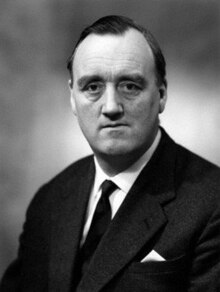
Back ويلى وايتيلاو ARZ William Whitelaw, 1. vicegreve Whitelaw Danish William Whitelaw, 1. Viscount Whitelaw German William Whitelaw Spanish William Stephen Whitelaw French William Whitelaw Irish William Stephen Whitelaw Italian ウィリアム・ホワイトロー (初代ホワイトロー子爵) Japanese Willie Whitelaw Dutch William Stephen Ian Whitelaw NB
The Viscount Whitelaw | |||||||||||||||||||||||||||||
|---|---|---|---|---|---|---|---|---|---|---|---|---|---|---|---|---|---|---|---|---|---|---|---|---|---|---|---|---|---|
 Whitelaw in 1963 | |||||||||||||||||||||||||||||
| Deputy Prime Minister of the United Kingdom | |||||||||||||||||||||||||||||
| De facto 4 May 1979 – 10 January 1988 | |||||||||||||||||||||||||||||
| Prime Minister | Margaret Thatcher | ||||||||||||||||||||||||||||
| Preceded by | Rab Butler (de facto) | ||||||||||||||||||||||||||||
| Succeeded by | Geoffrey Howe | ||||||||||||||||||||||||||||
| Lord President of the Council | |||||||||||||||||||||||||||||
| In office 11 June 1983 – 10 January 1988 | |||||||||||||||||||||||||||||
| Prime Minister | Margaret Thatcher | ||||||||||||||||||||||||||||
| Preceded by | John Biffen | ||||||||||||||||||||||||||||
| Succeeded by | John Wakeham | ||||||||||||||||||||||||||||
| In office 20 June 1970 – 7 April 1972 | |||||||||||||||||||||||||||||
| Prime Minister | Edward Heath | ||||||||||||||||||||||||||||
| Preceded by | Fred Peart | ||||||||||||||||||||||||||||
| Succeeded by | Robert Carr | ||||||||||||||||||||||||||||
| Leader of the House of Lords | |||||||||||||||||||||||||||||
| In office 11 June 1983 – 10 January 1988 | |||||||||||||||||||||||||||||
| Prime Minister | Margaret Thatcher | ||||||||||||||||||||||||||||
| Preceded by | The Baroness Young | ||||||||||||||||||||||||||||
| Succeeded by | The Baron Belstead | ||||||||||||||||||||||||||||
| Home Secretary | |||||||||||||||||||||||||||||
| In office 4 May 1979 – 11 June 1983 | |||||||||||||||||||||||||||||
| Prime Minister | Margaret Thatcher | ||||||||||||||||||||||||||||
| Preceded by | Merlyn Rees | ||||||||||||||||||||||||||||
| Succeeded by | Leon Brittan | ||||||||||||||||||||||||||||
| Deputy Leader of the Conservative Party | |||||||||||||||||||||||||||||
| In office 12 February 1975 – 7 August 1991 | |||||||||||||||||||||||||||||
| Leader | Margaret Thatcher John Major | ||||||||||||||||||||||||||||
| Preceded by | Reginald Maudling (1972) | ||||||||||||||||||||||||||||
| Succeeded by | Peter Lilley (1998) | ||||||||||||||||||||||||||||
| Secretary of State for Employment | |||||||||||||||||||||||||||||
| In office 2 December 1973 – 4 March 1974 | |||||||||||||||||||||||||||||
| Prime Minister | Edward Heath | ||||||||||||||||||||||||||||
| Preceded by | Maurice Macmillan | ||||||||||||||||||||||||||||
| Succeeded by | Michael Foot | ||||||||||||||||||||||||||||
| Secretary of State for Northern Ireland | |||||||||||||||||||||||||||||
| In office 24 March 1972 – 2 December 1973 | |||||||||||||||||||||||||||||
| Prime Minister | Edward Heath | ||||||||||||||||||||||||||||
| Preceded by | Office created | ||||||||||||||||||||||||||||
| Succeeded by | Francis Pym | ||||||||||||||||||||||||||||
| Leader of the House of Commons | |||||||||||||||||||||||||||||
| In office 20 June 1970 – 7 April 1972 | |||||||||||||||||||||||||||||
| Prime Minister | Edward Heath | ||||||||||||||||||||||||||||
| Preceded by | Fred Peart | ||||||||||||||||||||||||||||
| Succeeded by | Robert Carr | ||||||||||||||||||||||||||||
| |||||||||||||||||||||||||||||
| |||||||||||||||||||||||||||||
| |||||||||||||||||||||||||||||
| |||||||||||||||||||||||||||||
| Personal details | |||||||||||||||||||||||||||||
| Born | William Stephen Ian Whitelaw 28 June 1918 Edinburgh, Scotland | ||||||||||||||||||||||||||||
| Died | 1 July 1999 (aged 81) Blencow, England | ||||||||||||||||||||||||||||
| Political party | Conservative | ||||||||||||||||||||||||||||
| Spouse | |||||||||||||||||||||||||||||
| Children | 4 | ||||||||||||||||||||||||||||
| Alma mater | Trinity College, Cambridge | ||||||||||||||||||||||||||||
| Military service | |||||||||||||||||||||||||||||
| Allegiance | |||||||||||||||||||||||||||||
| Branch/service | |||||||||||||||||||||||||||||
| Years of service | 1939–1946 | ||||||||||||||||||||||||||||
| Rank | Major | ||||||||||||||||||||||||||||
| Unit | Scots Guards | ||||||||||||||||||||||||||||
| Battles/wars | World War II | ||||||||||||||||||||||||||||
William Stephen Ian Whitelaw, 1st Viscount Whitelaw, KT, CH, MC, PC, DL (28 June 1918 – 1 July 1999) was a British Conservative Party politician who served in a wide number of Cabinet positions, most notably as Home Secretary from 1979 to 1983 and as de facto Deputy Prime Minister of the United Kingdom from 1979 to 1988.[1][2][3] He was Deputy Leader of the Conservative Party from 1975 to 1991.[4]
After the Conservative Party won an unexpected victory at the 1970 general election, Whitelaw was appointed as Leader of the House of Commons and Lord President of the Council by Prime Minister Edward Heath. After the suspension of the Stormont Parliament resulted in the imposition of direct rule, Whitelaw served as Secretary of State for Northern Ireland from 1972 to 1973. He also served under Heath as Secretary of State for Employment from 1973 to 1974 and as Chairman of the Conservative Party from 1974 to 1975.
Whitelaw served Prime Minister Margaret Thatcher throughout her leadership of the Conservative Party as deputy party leader. He served as de facto Deputy Prime Minister between 1979 and 1988 and as Home Secretary from 1979 to 1983. He stepped down as a Member of Parliament at the 1983 general election, and was appointed as a Member of the House of Lords. He served as Leader of the House of Lords and Lord President of the Council from 1983 to 1988. He was a captain of The Royal and Ancient Golf Club of St Andrews.[5]
- ^ "Letter to Lord Whitelaw (resignation)". Margaret Thatcher Foundation. 10 January 1988. Retrieved 21 June 2017.
- ^ Hennessy, Peter (2001). "A Tigress Surrounded by Hamsters: Margaret Thatcher, 1979–90". The Prime Minister: The Office and Its Holders since 1945. Penguin Group. ISBN 978-0-14-028393-8.
- ^ Aitken, Ian (2 July 1999). "Viscount Whitelaw of Penrith". The Guardian. Retrieved 28 June 2017.
- ^ "Willie Whitelaw dies aged 81". The Guardian. Press Association. 1 July 1991. Retrieved 28 June 2017.
- ^ Daily Telegraph, Doug Sanders obituary, 20 April 2020
© MMXXIII Rich X Search. We shall prevail. All rights reserved. Rich X Search